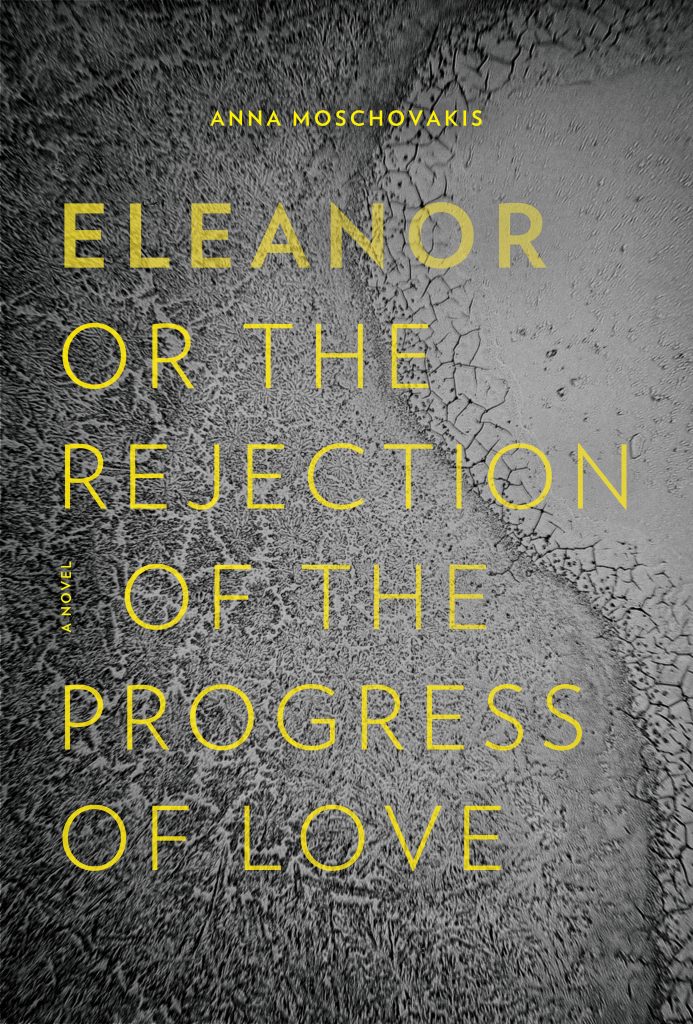
(Coffee House Press, 2018)
REVIEW BY NICHOLE REBER
—
Eight of the last 10 books I’ve opened landed in my Donate pile well before page 99. When it came to Anna Moschovakis’s Eleanor, or the Rejection of the Progress of Love, I found a book I nearly imbibed. Most of us do when reading something we can relate to. The book is, in essence, about existential angst of our zeitgeist. However, for me there was delight in reading about sex, sexuality, and the first steps of mid-life during that zeitgeist. So few art forms capture this period of life well from a woman’s POV, and Moschovakis does it in parallel plots.
One prong of the bifurcated plot features the protagonist, 37-year-old Eleanor. It opens with her sitting in a cafe, its staff a little too hip with their veritable clothing of tattoos and piercings. Upon returning from the loo her laptop has been stolen. This leads to a geographical and existential journey rife that may be a mid-life crisis. One might say her laptop is that sparkly youth and the thief represents time. She chases the foreigner who’s likely stolen her laptop, searching for him through Google, email, text, and New York. Along the way, we pass landmark that range from sexual liberation and bisexuality to feminism and childlessness, and from aging and friendships to travel and crumbling traditions. Meanwhile she recognizes that men don’t approach her as readily as she had grown accustomed to in her youth.
“She ran her hand through her hair; a crinkled grey strand appeared in her fingers, followed by a sudden need to be noticed, but only just, only for a minute.”
When the thief texts her a photo of Canada, she seems to understand that chasing after lost youth is pointless. But still propelled by the mid-life crisis, she keeps traveling, gradually coming to terms with her new phase in life, finding new comfort in contentedness and new dimensions to friendships that simply aren’t possible in the know-it-all invincibility of youth.
“…The women to whom she was so fiercely loyal had made choices that were in fact fundamentally different, especially in relation to male authority…and that even though their mutual fierce loyalty might well continue in the face of this difference, it was a difference nonetheless, and one that contributed to Eleanor’s feeling of special loneliness in this moment, as she walked somewhat quickly by five or six male road workers…attempting both to ignore and to interpret the expressions on their faces.”
Meanwhile, the second plot prong centers on a nameless first-person narrator. In this strand Moschovakis demonstrates the growing pains, AKA contradictions, that stem from growth. We morph into our new phases, while elements of the previous one still linger. In that liminal space she still believes the philosophy of the passing generations: to seek approval from male authority figures such as one of her former professors, a critic named Aidan. Yet now, meeting Aidan in her adulthood and as a fellow professor, we see her coming to trust herself more as a writer, knowing when to listen to and when to ignore Aidan’s (a man’s) constructive criticism.
“You could say that I was becoming blurred at my edges. When I worked on my revision, the critic’s marginalia invaded my mind.”
Meanwhile, as her confidence grows, she mocks the commonly held belief that women can’t or shouldn’t write sex, that it’s too emotional. I laughed when she employed the paragraph and sentence structure Aidan said was indicative of romance novels, implicitly skewering him as she write about what women really think about whilst enduring boring sex.
Eventually, the first-person narrator and Eleanor become one, a woman wise enough to know she doesn’t know it all. Maturing confidence meet acceptance in a way that allows her to accept flaws— in herself and others— and lean toward intimacy.
Moschovakis’s Eleanor, like many books published today, contains essayistic pondering along with plot progression and character development inherent of novels. It combines some lyrical prose, prose poetry, and traditional poetry.
It’s not a perfect book. The last quarter frays into a series of parcels about as long and substantial as a Tweet. Moschovakis might use these staticky fits and starts to parallel social media or our minds on social media, but it was utterly skimmable. Nor did I appreciate the inundation of artistic references; the ubiquity of these came to feel like a crutch for the author, akin to David Foster Wallace’s footnotes.
The end further suffers from a seemingly random geographic jump too. The plot makes clear why she leaves New York City for upstate New York, for Albany, and elsewhere in the country for an event with critic Aidan, but what bring her to Ethiopia? It’s not an unforgivable flaw. In fact, I forgive it because by the time you reach middle age you’ll have been somewhere or done something in your life that you could not have imagined or foreseen in your 20s. You come to a place or a time in your life when you thump your noggin and say, “How the hell did I get here?” However, I may be projecting.
Despite these minor flaws, Moschovakis’s Eleanor, or the Rejection of the Progress of Love offers literary and plot interests on most every page. It’s a book meant for those of us whose sparkle is wearing off and whose lives are beginning to resemble something in a Camus novel.
Moschvakis’s other books are of poetry include You and Three Others Are Approaching a Lake and They and We Will Get into Trouble for This. She has also translated books from French.
—
Nichole L. Reber picked up a love for world lit by living in countries around the globe. She’s a nonfiction writer and her award-winning work has been in World Literature Today, Ploughshares, The Rumpus, Lunchticket, and elsewhere. Read her stories on a Chinese cult, wearing hijab in India, and getting kidnapped in Peru at http://www.nicholelreber.com/.
![[PANK]](https://pankmagazine.com/wp-content/themes/pank/assets/images/pank-logo-large.png)
